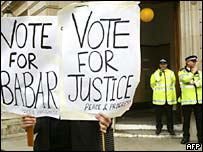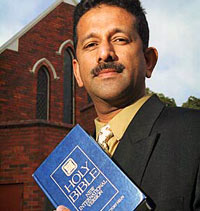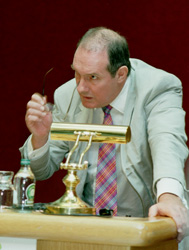 An unsuitable case for extradition
An unsuitable case for extradition
The argument that Babar Ahmad is a terrorist who should be handed over to the United States is highly suspect. Solomon Hughes reports.
Tribune, 17 June 2005
Home Secretary Charles Clarke must now decide whether to extradite British computer worker Babar Ahmad to the United States by July 15. Connecticut’s district attorney says Ahmad used a website to raise money for Chechen terrorists and the Taliban. On May 17, Judge Timothy Workman ruled the extradition was in order, passing it to Clarke for a decision. However, in his judgement, Workman said: “This is a difficult and troubling case. The defendant is a British subject who is alleged to have committed offences which, if the evidence were available, could have been prosecuted in this country.”
But while Ahmad has been arrested and investigated by British police, he has never been prosecuted in Britain. The Americans claim jurisdiction only because the “Azzam.Com” website in question had a US Internet service provider. Otherwise, all the offences they allege took place in Tooting.
Judge Workman added: “I have no doubt that the many and complex issues that have arisen in this case will need to be explored by the High Court which can review the decision.
The judge emphasised that he did not consider the evidence against Ahmad, who faces extradition under extradition laws introduced by David Blunkett after September 11. As Judge Workman made clear, under Blunkett’s law: “The need for the United States Government to provide prima facie evidence to support the charges has been removed.”
The judge also noted that Blunkett’s extradition law contains “no reciprocal benefit to this country”. While the law comes from a treaty between the US and Britain, the British cannot extradite US citizens in the same way, without evidence being tested in court. The extradition law is a one-way street because of what Judge Workman called “the failure to ratify the treaty by the United States.”
Under the law, the judge could not consider the evidence and instead looked carefully at American guarantees that they would not send Ahmad to Guantanamo Bay, put him before a “military commission”, “render” him to another country or apply the death penalty. The judge made clear that Guantanamo Bay or other options under US “Military Order Number One” were “inhuman and degrading”, but accepted guarantees from the American Embassy that this would not happen.
The US evidence, untested in the British courts, tries to show that Ahmad did more than run Islamist websites and actually funded terrorists. Yet, an American man, who is supposedly Ahmad’s co-conspirator according to the US case, was recently invited to dinner with President George Bush.
Continue reading →
 A Christian pastor who has been ordered to apologise for vilifying Muslims says he will go to jail rather than say sorry for his comments.
A Christian pastor who has been ordered to apologise for vilifying Muslims says he will go to jail rather than say sorry for his comments.
 “Being a Muslim, especially a Muslim woman, in Britain is for many a dispiriting and occasionally terrifying experience. The society that prides itself on tolerance has lost its bearings over Islam. On the streets, the prejudice that Islam is irrationally and murderously violent and menacingly foreign has spawned a subculture of hatred and abuse. If you are a woman in a hijab, being jeered at, even spat at, is routine. Many never venture from their houses.
“Being a Muslim, especially a Muslim woman, in Britain is for many a dispiriting and occasionally terrifying experience. The society that prides itself on tolerance has lost its bearings over Islam. On the streets, the prejudice that Islam is irrationally and murderously violent and menacingly foreign has spawned a subculture of hatred and abuse. If you are a woman in a hijab, being jeered at, even spat at, is routine. Many never venture from their houses. “Do you believe that anyone should be allowed to incite hatred against other people on the grounds of their religious belief? I don’t, even though I have no religious belief myself. That’s because I believe that nobody should suffer assaults, or live in fear, because of their religious beliefs. But they do. Today. In our country.
“Do you believe that anyone should be allowed to incite hatred against other people on the grounds of their religious belief? I don’t, even though I have no religious belief myself. That’s because I believe that nobody should suffer assaults, or live in fear, because of their religious beliefs. But they do. Today. In our country. An unsuitable case for extradition
An unsuitable case for extradition